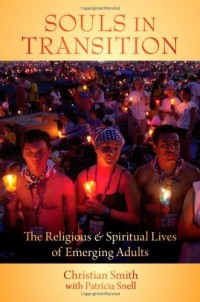Soul Searching, five years on…

Even though Soul Searching was published in 2005, there is little reason to think that things have improved in the spiritual lives of American teens. In fact, in a follow-up study, Souls in Transition: The Religious and Spiritual Lives of Emerging Adults, Christian Smith found that five years later little had changed in the lives of this same cohort, now in their early twenties.
Moralistic Therapeutic Deism is still the de facto practiced religious faith, but it becomes a little more complicated for emerging adults. They have more life experience, so some of them are starting to ask, “Does MTD really work? Isn’t life more complicated than this?” MTD is easier to believe and practice when you are in high school.
There is also a much larger segment of emerging adults than of teenagers that is outrightly hostile to religion. Some who previously were MTDS have become anti-religious. That said, the center of gravity among emerging adults is definitely MTD. Most emerging adults view religion as training in becoming a good person. And they think they are basically good people. To not be a good person, you have to be a horrible person. Therefore, everything’s fine.
An interview with Christian Smith discussing the research reported on in Souls in Transition: The Religious and Spiritual Lives of Emerging Adults is available at Christianity Today.


 July 20, 2012
July 20, 2012 







I cannot say that I enjoyed reading these articles in that they expose a sadness about the state of Christianity. The “Peter Pan” never grow-up Christianity of our day is curve ball thrown by the power of darkness to be sure that authentic Christianity is never found. As Jesus said of the converts of the Pharisees, our churches are full of those that are twice the child of hell because they now cannot be given what they think they already have. As the one article aptly put it, a cross-life is not apealing to those looking for a warm and fuzzy blanket. At the end of the day, many are finding that fullness of life escapes them even though they faithfully attend the pep ralley concert each week.
Ed Malone
Ed, I share your sadness. Thanks for your comments! But from my vantage point, I see lots and lots of hope!! In the past five or so years, I’ve witnessed the rise of a young cohort of Christians—a small, but growing group—that takes their faith seriously in a way that we “baby boomers” don’t. This group includes young pastors, church staffers, young theologians, bloggers and campus ministers as well as a good contingent of lay men and women. They’re not drawn by what you call the “pep rally” church. Neither are they drawn by the “hunkered-down” church that lacks a vision for what it means to be The Church in our post-Christian age. They read and discuss theology. They want to know how to do evangelism in our pluralistic culture. They are passionate about one-on-one discipleship. They find role models in individuals as dissimilar as Mark Dever and Lesslie Newbigin. They seek something beyond the opposite extremes of “pep rally” and “going through the motions.” They know, use and discuss semper reformanda, one of the crucial summary statements of the Reformation: Reformed and always being reformed.
I would add: The work of writers like Christian Smith and Thomas Bergler (with their descriptive terminology, moralistic therapeutic deism and juvenilized Christianity) may make us sad, but they should also motivate us to work to reverse these trends. It should inspire a vision of reformation—a vision with legs, not just rhetoric!